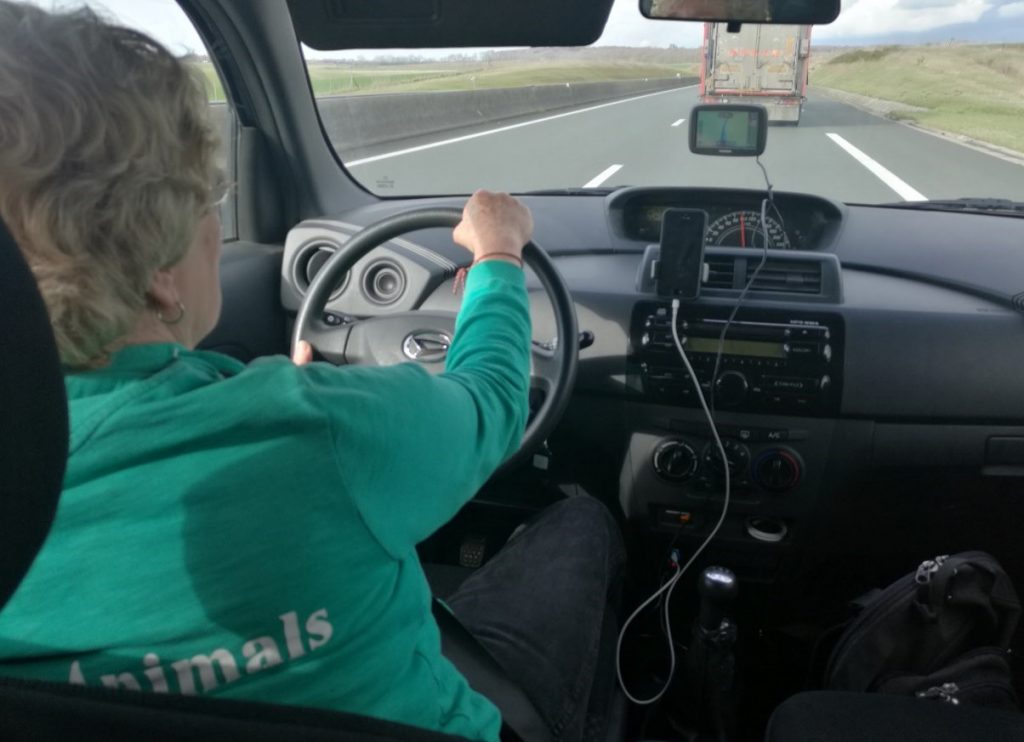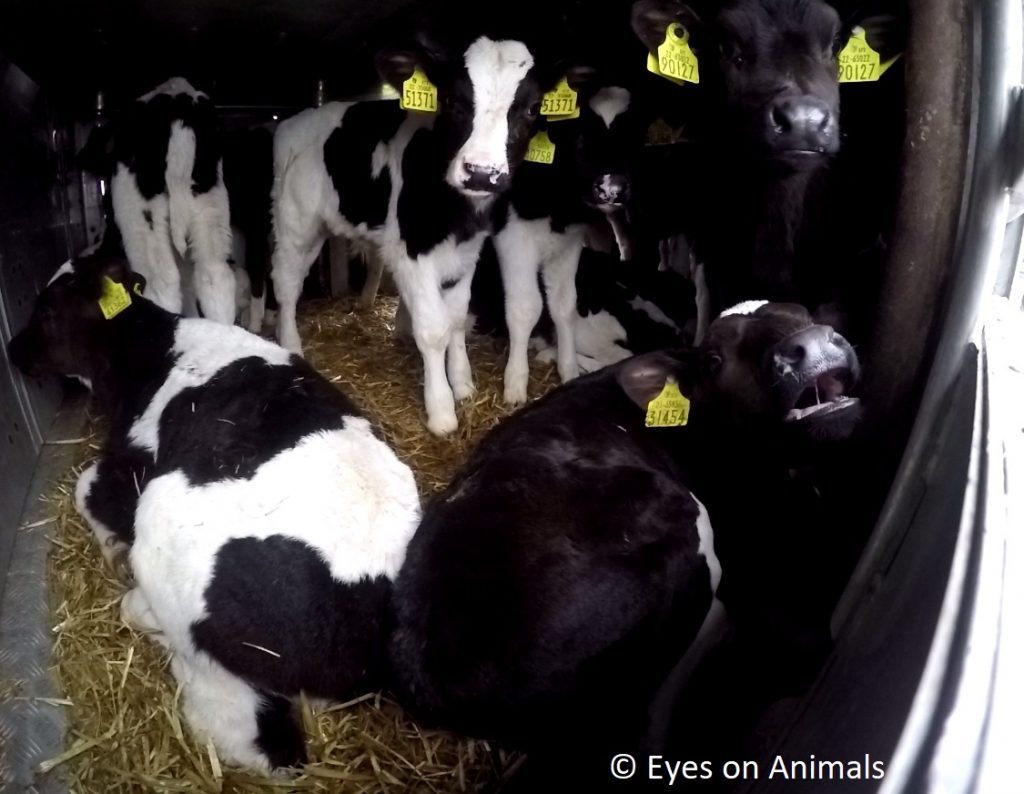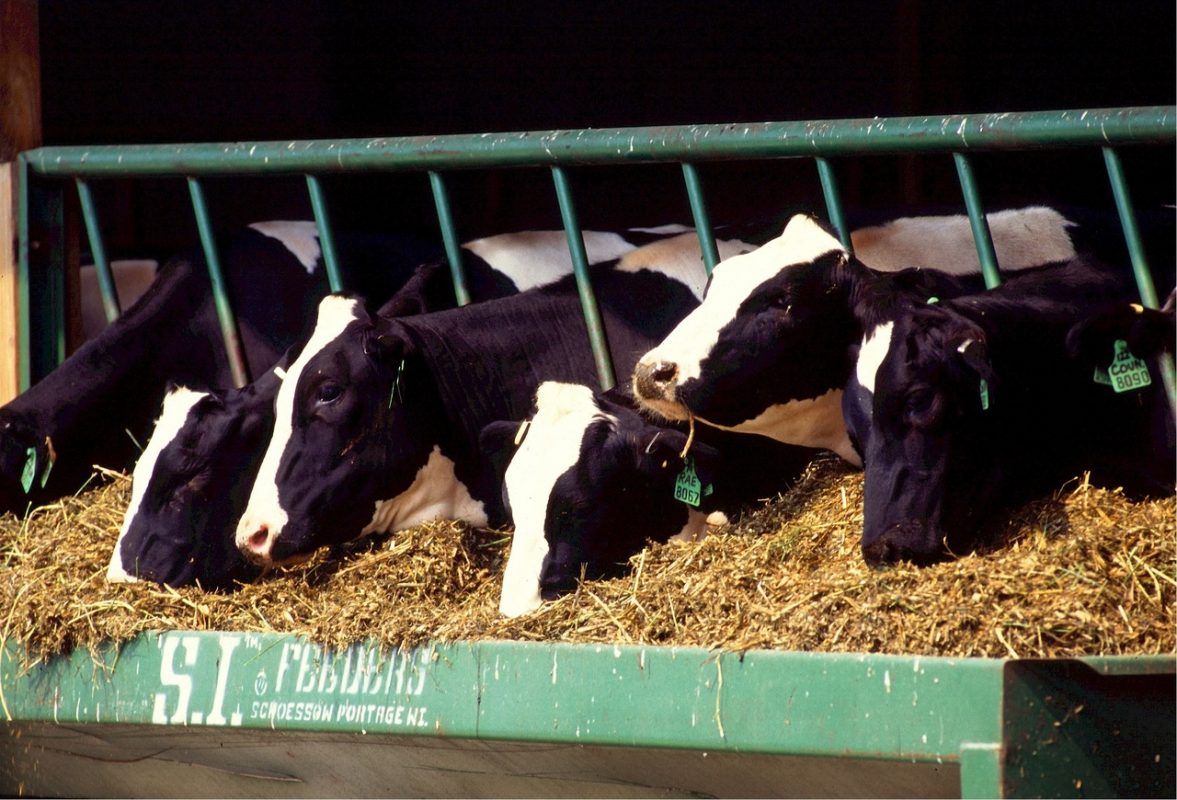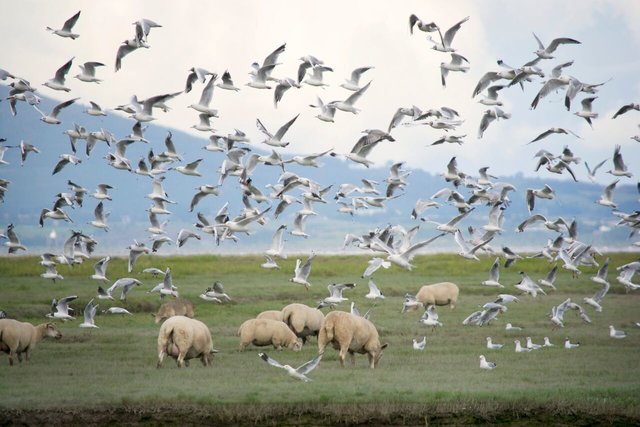Irish State accused of facilitating unlawful transport of calves to Europe

June 7th, 2018
The Irish authorities stand accused of facilitating the transportation of unweaned calves as young as two weeks old in breach of EU laws following an investigation by a European animal rights organisation.
In March, Eyes on Animals sent a team to Rosslare to track and inspect trucks carrying up to 5,000 unweaned calves between two and four weeks old.
The investigative team found that the journey of at least 17 trucks violated European animal welfare regulations on multiple grounds.
Speaking to The Green News, Eyes on Animals member Nicola (who wished for her full name to be withheld due to safety concerns) said that she followed the trucks as they drove to Rosslare port and watched the calves being loaded onto the Ferry.
Eyes on Animals documented that the ferry journey alone lasted 19 hours including loading and unloading times. “[Loading] alone took five hours,” Nicola said, with the calves “confined” in the trucks where space is tight for this period.
EU regulations state that after nine hours of travel unweaned animals must be given a rest period of at least one hour to receive liquids and feed.
A maximum overall journey time of 19 hours is allowed after which the animals must be unloaded and rested for at least 24 hours.
EU regulations also state that each consignment of animals should have one attendant per consignment. On this particular journey of at least 17 trucks, there were reportedly just three attendants on board to care for up to 5,000 calves.
After arriving in Cherbourg, France, an additional Eyes on Animals team documented that at least six of the trucks did not stop at the first available control post in Tollevast to unload, feed and rest the calves as required.
The six trucks are reported to have driven past the control post, continuing for a further five hours to a different control post in Abbeville.
This meant that the trucks exceeded the maximum transport time for unweaned calves and did not provide the animals with the appropriate amount of rest time as required under EU regulations.

Eyes on Aminals team following one of the trucks transporting Irish calves Photo: Eyes on Animals
Unsuitable Conditions
An Eyes on Animals team trailed one of the calf truck belonging to the transport-company Hallissey Livestock Exports to a veal farm in The Netherlands.
The total journey took over 56 hours, including the ferry crossing of 19 hours and a rest time of 12 hours at the Abbeville control post, the group said.
The investigators found that the calves were confined inside the truck for the first leg of the journey lasting 32 hours, a total of 13 hours over the maximum time allowed.
While there was enough bedding onboard and the loading density was acceptable, the truck was equipped with a water system that was unsuitable for unweaned calves, according to Eyes on Animals.
Many of the rubber teats to cover the old metal nipples were missing, and the teats were not pointing inwards as required, making them “unacceptable and useless” for the calves, the group said.
According to Eyes on Animals, the Irish authorities should not have approved this water system as it is in conflict with requirements set by both the Dutch authorities and EU regulations.
All the calves survived the journey to the Netherlands, according to Nicola, although they were not unscathed from their journey.
“Some of these young calves went unfed for up to 30 hours. When they arrived in the Netherlands they had sunken stomachs, diarrhoea, runny noses and were very distressed,” she said.
The driver allegedly told the Eyes on Animals team that the journey log indicated that he was to stop at the Abbeville control post and that the journey had been approved by the Irish authorities.
The Department of Agriculture is responsible for authorising the transportation of live animals on journeys over 65km as set out under EU regulations to protect live animals during transport.
According to Nicola, the Irish authorities should “never have approved those journey logs” in the first place. “The control post [near Cherbourg] is only able to hold up to 1,500 calves. They knew a shipment of about 17 calf trucks weren’t going to be able to stop there,” she added.
A similar case involving Hallissey was recorded by a group of NGOs including the Animal Welfare Foundation and Eyes on Animals in April 2016.
According to the NGOs, calves were shipped continuously for over 27 hours without access to water or feed in cramped conditions. Two calves reportedly died on the journey from Killarney to France.
The Green News sent a list of detailed questions to Hallissey Livestock Exports, however, did not receive any reply at the time of publication.
The trucks were transported by a Stena Line ferry deployed for transporting calves in February and March this year. The ferry company did not respond to inquiries for comment from both Eyes on Animals and The Green News.
Another animal rights group, Compassion in World Farming, has created an online petition calling for Stena Line to stop transporting calves and cattle for live export.

Inside one of the trucks transporting calves to The Netherlands Photo: Eyes of Animals
Irish Live Exports
Eyes on Animals, together with Compassion in World Farming, the Animal Welfare Foundation and L214, reported the case from March to the authorities in both Ireland and The Netherlands.
Eyes on Animals confirmed to The Green News that the Irish authorities responded to their report and said that they are currently investigating the case.
The group said that it will make a formal complaint to the European Commission if it does not get a satisfactory explanation from the Department of Agriculture. The Department did not respond to questions from The Green News at the time of publication.
The Green News also sent an Access to Information on the Environment Request (AIE) to the Department requesting access to inspection reports of vehicles used for live exports.
Data released by the Department revealed that only 15 inspections were carried out in 2017 on vehicles used for the transportation of animals on long journeys.
Over 100,000 calves were transported for live export in 2017, up 30 per cent from the previous year. This was largely due to charges for calf exports decreasing from €4.80 to €1.20 per head.
The Irish Farmers’ Association called for an additional increase of 100,000 live exports for 2018 at a Bord Bia live exports seminar in January.
[x_author title=”About the Author”]







